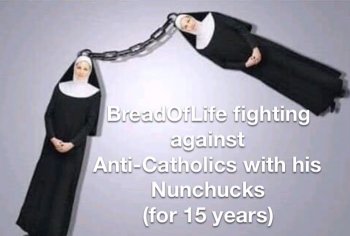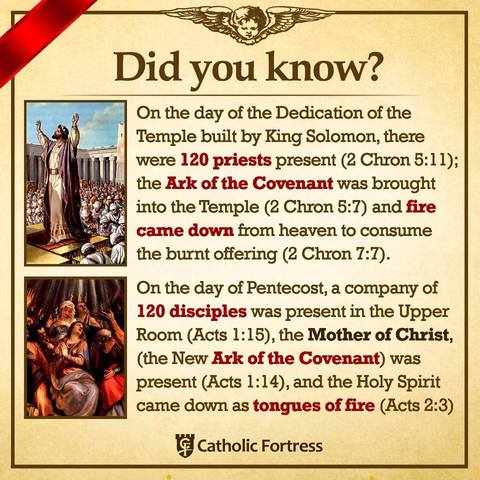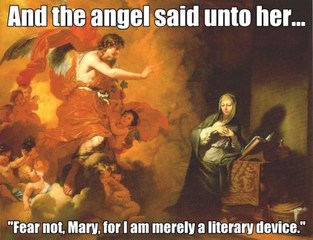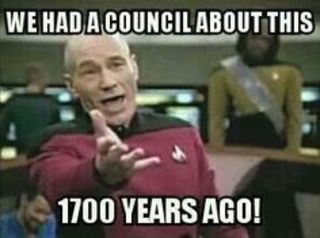Luke 1:28 [RSV]: "And he came to her and said, 'Hail, O favored one, the Lord is with you!'"
[The RSVCE translates
kecharitomene ("favored one" above) as "full of grace"]
Catholics believe that this verse is an indication of the sinlessness of Mary - itself the kernel of the more developed doctrine of the Immaculate Conception. But that is not apparent at first glance (especially if the verse is translated "highly favored" - which does not bring to mind sinlessness in present-day language). I have done a great deal of exegesis and analysis of this verse, in dialogue with Evangelical Protestants, and so I shall draw from that thought and experience in this chapter.
Protestants are hostile to the notions of Mary's freedom from actual sin and her Immaculate Conception (in which God freed her from original sin from the moment of her conception) because they feel that this makes her a sort of goddess and improperly set apart from the rest of humanity. They do not believe that it was fitting for God to set her apart in such a manner, even for the purpose of being the Mother of Jesus Christ, and don't see that this is "fitting" or "appropriate" (as Catholics do).
The great
Baptist Greek scholar A.T. Robertson exhibits a Protestant perspective, but is objective and fair-minded, in commenting on this verse as follows:
"Highly favoured" (
kecharitomene). Perfect passive participle of
charitoo and means endowed with grace (
charis), enriched with grace as in
Ephesians. 1:6, . . . The Vulgate
gratiae plena "is right, if it means 'full of grace
which thou hast received'; wrong, if it means 'full of grace
which thou hast to bestow'" (Plummer).
(Robertson, II, 13)
Kecharitomene has to do with God’s grace, as it is derived from the Greek root,
charis (literally, "grace"). Thus, in the KJV,
charis is translated "grace" 129 out of the 150 times that it appears.
Greek scholar Marvin Vincent noted that even Wycliffe and Tyndale (no enthusiastic supporters of the Catholic Church) both rendered
kecharitomene in
Luke 1:28 as "full of grace" and that the literal meaning was "endued with grace" (Vincent, I, 259).
Likewise, well-known
Protestant linguist W.E. Vine, defines it as "to endue with Divine favour or grace" (Vine, II, 171). All these men (except Wycliffe, who probably
would have been, had he lived in the 16th century or after it) are Protestants,
and so cannot be accused of Catholic translation bias. Even a severe critic of Catholicism like James White can’t avoid the fact that
kecharitomene (however translated) cannot be divorced from the notion of grace, and stated that the term referred to "divine favor, that is, God’s grace" (White, 201).
Of course, Catholics agree that Mary has
received grace. This is assumed in the doctrine of the Immaculate Conception: it was a grace from God which could not
possibly have had anything to do with Mary's personal merit, since it was granted by God at the moment of her conception, to preserve her from original sin
(as appropriate for the one who would bear God Incarnate in her very body).
The Catholic argument hinges upon the meaning of
kecharitomene. For Mary this signifies
a state granted to her, in which she enjoys an extraordinary fullness of grace.
Charis often refers to a power or ability which God grants in order to overcome sin (and this is how we interpret
Luke 1:28). This sense is a biblical one, as Greek scholar Gerhard Kittel points out:
Grace is the basis of justification and is also manifested in it ([Rom.] 5:20-21). Hence grace is in some sense a state (5:2), although one is always called into it (
Gal. 1:6), and it is always a gift on which one has no claim. Grace is sufficient (
1 Cor. 1:29) . . . The work of grace in overcoming sin displays its power (
Rom. 5:20-21) . . .
(Kittel, 1304-1305)
Protestant linguist W.E. Vine concurs that
charis can mean "a state of grace, e.g.,
Rom. 5:2;
1 Pet. 5:12;
2 Pet. 3:18" (Vine, II, 170). One can construct a strong biblical argument from analogy, for Mary's sinlessness. For St. Paul, grace (
charis) is the antithesis and "conqueror" of sin (emphases added in the following verses):
Romans 6:14: "For sin will have no dominion over you, since you are not under law but under grace." (cf. Rom 5:17,20-21, 2 Cor 1:12, 2 Timothy 1:9)
We are saved by grace, and grace alone:
Ephesians 2:8-10: "For by grace you have been saved through faith; and this is not your own doing, it is the gift of God - not because of works, lest any man should boast. For we are his workmanship, created in Christ Jesus for good works, which God prepared beforehand, that we should walk in them." (cf. Acts 15:11, Rom 3:24, 11:5, Eph 2:5, Titus 2:11, 3:7, 1 Pet 1:10)
Thus, the biblical argument outlined above proceeds as follows:
1. Grace saves us.
2. Grace gives us the power to be holy and righteous and without sin.
Therefore, for a person to be
full of grace is both to be saved and to be completely, exceptionally holy. It's a "zero-sum game": the more grace one has, the less sin. One might look at grace as water, and sin as the air in an empty glass (us). When you pour in the water (grace), the sin (air) is displaced. A full glass of water, therefore, contains no air (see also, similar zero-sum game concepts in
1 John 1:7,
9;
3:6,
9;
5:18). To be full of grace is to be devoid of sin. Thus we might re-apply the above two propositions:
1. To be full of the grace that saves is surely to be saved.
2. To be full of the grace that gives us the power to be holy, righteous, and without sin is to be fully without sin, by that same grace.
A deductive, biblical argument for the Immaculate Conception,
with premises derived directly from Scripture, might look like this:
1. The Bible teaches that we are saved by God's grace.
2. To be "full of" God's grace, then, is to be saved.
3. Therefore, Mary is saved (
Luke 1:28).
4. The Bible teaches that we need God's grace to live a holy life, free from sin.
5. To be "full of" God's grace is thus to be so holy that one is sinless.
6. Therefore, Mary is holy and sinless.
7. The essence of the Immaculate Conception is sinlessness.
8. Therefore, the Immaculate Conception, in its essence, can be directly deduced from Scripture.
The only way out of the logic would be to deny one of the two premises, and hold either that grace does not save or that grace is not that power which enables one to be sinless and holy.
It is highly unlikely that any Evangelical Protestant would take such a position, so the argument is a very strong one, because it proceeds upon their own premises.
Read more:
https://www.catholicfidelity.com/apologetics-topics/mary/full-of-grace-and-the-linguistic-and-exegetical-considerations-by-dave-armstrong/
Somebody should tell David C. Grabbe that "grace" is in the Bible.






